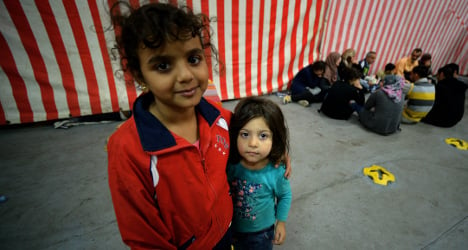"We must open legal routes to allow refugees to come to the European Union, otherwise they resort to illegal immigration channels," Home Affairs Commissioner Cecilia Malmström said ahead of a meeting of EU interior ministers in Milan.
"For the moment, the refugees have a very limited means of access to the European Union: through resettling. There is no other way," she said.
Malmström suggested creating humanitarian visas or dealing with asylum requests at consulates in refugee camps and at points along migrants' journeys, such as the routes taken from Syria to Libya or Egypt.
"But those proposals have not gone down very well," she said.
Sweden's minister for migration and asylum policy, Tobias Billström, said he would "like someone to explain what a humanitarian visa is".
"We have the resettlement programmes. All member states must participate, as Sweden and Germany do. Only 13 member states have this type of programme, while 15 have nothing," he said.
The resettlement programmes were set up by the UN refugee agency (UNHCR) to allow member states – on a voluntary basis – to agree to take in a certain number of people that the agency believes can no longer live in refugee camps.
"The countries neighbouring Syria currently look after three million refugees, and fewer than 100,000 of them have been relocated to the EU's 28 countries. That is not very many," Malmström said.
Asylum rules are very strict in the EU, where requests must be made in the country of entry. Once the registration process has begun – with the digital recording of fingerprints in particular – it is difficult for refugees to request asylum in another country.
Traffickers 'making a fortune'
While thousands arrive on Italy's coasts each year, many do not want to remain in the country and are forced to place themselves in the hands of traffickers to try to reach the European country of their choice.
The flow of migrants fleeing war zones and setting out from Libya to Italy, or from Turkey to Greece or Bulgaria, has sparked tensions within the EU.
But the deaths of hundreds of boat migrants during their voyages across the Mediterranean in recent tragedies has thrust the issue into the the public eye.
Border countries such as Italy complain they are being abandoned by their European partners to deal with the massive influx of people, while the northern countries insist they have their own migrants to deal with.
"When we look at the figures for arrivals in Italy, and compare them to the number of people who stay, there is a big difference. We have to talk about that," German Interior Minister Thomas de Maiziere said.
Sweden has accused the Italian authorities of letting refugees slip through the net without registration, so that they can be dealt with by another country, and Billström described as "a big problem" the fact that "many of those arriving in Italy want to go to Sweden and Germany."
While the ministers praised Italy for its "Mare Nostrum" ("Our Sea") operation – set up after nearly 400 migrants drowned last year off the island of Lampedusa last year – there have been complaints that the rescue mission actually encourages boats to set off.
"The traffickers know that the boats will be recovered [by the Italian navy], and are making a fortune" out of the refugees, a European official told AFP.
The number of migrant arrivals to Italy this year has now soared past the record 63,000 set in 2011 during the Arab Spring uprisings, with an average of 270 people being plucked off overcrowded boast each day.
Italy has called on the EU to help with "Mare Nostrum" by providing funds and resources, and the Milan meeting should determine whether they are ready to do just that.



 Please whitelist us to continue reading.
Please whitelist us to continue reading.
Member comments